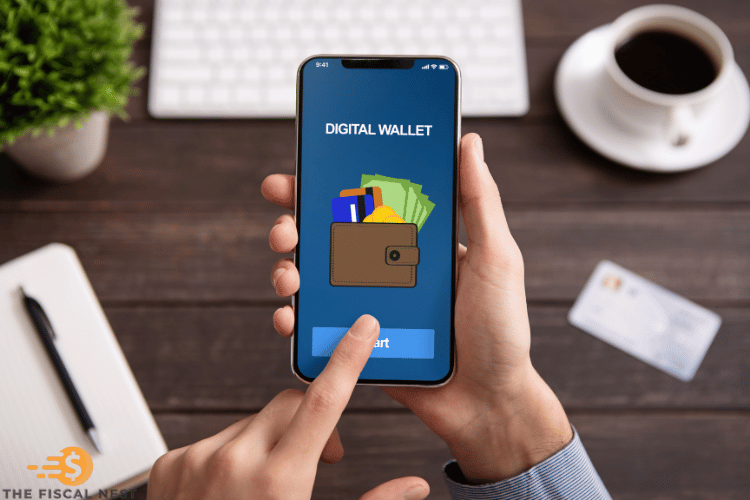In the quickly growing landscape of digital finance, the idea of a digital coin wallet is a cornerstone of security and accessibility. So, empowerment for cryptocurrency users all over the globe. As the adoption of digital currencies keeps on rising, the requirement for trustworthy, user-friendly storage solutions becomes increasingly important. A digital Crypto Wallet serves as the digital equivalent of a conventional wallet. Moreover, making users capable of safely storing, sending, and receiving different cryptocurrencies with convenience.
Other than just storage, these wallets cover cutting-edge encryption technology and innovative features. It is made to secure users’ assets against cyber threats while providing flawless access to the decentralized realm of digital currencies. Let’s delve deeper into the details of digital Crypto Wallets, finding their functionalities, and types. So, the fundamental principles that underpin their importance in the realm of modern finance.
What Is Digital Coin Wallet?
A digital Crypto Wallet is usually simply referred to as a cryptocurrency wallet. It is a software program or device that allows users to safely store, send, and receive digital currencies, such as Bitcoin, Ethereum, Litecoin, and others. Functionally, it acts as the digital equivalent of a conventional wallet for storing physical cash or cards.
Some Key Points About Digital Coin Wallets
- Storage: Digital Crypto Wallets hold the private keys which are essential to access and manage a user’s cryptocurrency holdings. These private keys are cryptographic strings that give access to the user’s funds on the blockchain.
- Security: Security is an important aspect of digital Crypto Wallets. They use advanced encryption techniques to protect users’ private keys. So, make sure that only the rightful owner can access and authorize transactions.
- Types: There are different types of digital Crypto Wallets, including software wallets (desktop, mobile, and online). Moreover, hardware wallets (physical devices), and paper wallets (physical documents containing private keys). Every type provides unique levels of security and ease.
- Functionality: In addition to fundamental storage and transaction capabilities, many digital Crypto Wallets provide additional features such as multi-currency support. So, incorporation with decentralized applications (DApps), and the ability to stake or earn interest on cryptocurrencies.
- Decentralization: Digital Cryptocurrency makes users capable of interacting directly with blockchain networks. So, going past conventional financial intermediaries such as banks. This decentralization is a main principle of cryptocurrencies and provides users with greater power over their funds.
Understanding The Importance of Secure Digital Bitcoin Wallet
Understanding the significance of secure wallets in the realm of digital coin transactions. It is important to protect one’s cryptocurrency holdings from possible threats and vulnerabilities. It is different from traditional banking systems, where financial institutions provide layers of protection. So, the decentralized nature of cryptocurrencies places the responsibility of security directly on the user. Secure wallets act as the frontline defence against numerous risks, consisting of hacking attempts, phishing attacks, and malware infections. Moreover, all of these pose considerable threats to the reliability of digital assets.

A secure wallet uses robust encryption protocols and advanced security measures to secure the private keys that grant access to the user’s funds. By prioritizing security features such as two-factor authentication, and biometric recognition. Furthermore, with cold storage solutions, users can reduce the risk of unauthorized access and ensure the safety of their cryptocurrency investments. In essence, understanding the importance of secure wallets allows users to steer the digital currency landscape with confidence. So, it is knowing that their assets are protected against possible threats and vulnerabilities.
Types Of Digital Altcoin Wallet
- Software Wallets: Software wallets are digital applications or programs that make users able to store, manage, and interact with their cryptocurrencies on different devices such as computers, smartphones, or tablets.
- Hardware Wallets: Hardware wallets are physical devices made specifically for the safe storage and management of cryptocurrencies. It is different from software wallets, which are digital applications, hence storing users’ private keys offline, making them less susceptible to hacking and online threats.
- Paper Wallets: Paper wallets are a type of offline cold storage for cryptocurrencies. They are fundamentally physical documents or pieces of paper that consist of the public and private keys necessary for accessing and managing cryptocurrencies.
How to Pick the Right Blockchain Wallet for Your Needs?
When selecting the appropriate cryptocurrency wallet, consider factors such as security, ease, and functionality to line up with your precise needs. Evaluate whether you prefer the robust security of hardware wallets, the accessibility of software wallets, or the offline storage provided by paper wallets. In addition to this, evaluate features like multi-currency support, convenient usage, and compatibility with your preferred cryptocurrencies to make an up-to-date decision.
Best Practices for Securing Your Digital Coin Wallet
Securing your digital wallet is important to protecting your cryptocurrency assets. Using best practices starts with choosing a wallet provider with a good reputation and enabling two-factor authentication for an extra layer of security. Use strong, different passwords and consider storing your private keys offline in a hardware wallet or paper backup. Regularly update your wallet software to patch vulnerabilities and be alert of phishing attempts and suspicious links. Stay away from sharing sensitive information online and only transact on safe networks. Finally, consider diversifying your holdings across multiple wallets to reduce risk in case of a breach.
Future Of Ethereum Wallet Technology
The future of digital Virtual Currency Wallet technology promises constant innovation to address emerging security threats and boost user experience. Anticipate watching advancements in biometric authentication, integrating features like fingerprint or facial recognition to bolster wallet security. Furthermore, interoperability among different wallet platforms may become easier. It allows for greater flexibility in managing a wide range of cryptocurrency portfolios.
Decentralized finance (DeFi) integration could also shape the landscape. So, this makes users capable of accessing lending, borrowing, and staking services directly from their wallets. As the industry matures, user-centric design and intuitive interfaces will become increasingly prevalent, simplifying complex processes and driving mainstream adoption of digital Virtual Currency Wallets in daily financial transactions.
Common Mistakes to Avoid with Crypto Asset Wallet
- Neglecting Backup Procedures: Failing to make and safely store backups can result in permanent loss of access to funds.
- Sharing Private Keys: Unveiling private keys compromises wallet security and exposes assets to theft or unauthorized transactions.
- Ignoring Software Updates: Neglecting to update wallet software exposes vulnerabilities and uplifts the risk of exploitation by malicious actors.
- Using Unsecured Networks: Performing transactions using unsafe Wi-Fi networks exposes private information and leaves wallets exposed to interception.
- Falling for Phishing Scams: Responding to unsolicited emails or messages requesting wallet credentials can lead to identity theft and financial loss.
The Role of Wallets in the Cryptocurrency Ecosystem
Wallets serve as the cornerstone of the cryptocurrency ecosystem, aiding safe storage, flawless transactions, and user empowerment. They enable people to manage their digital assets independently, without depending on centralized authorities like banks. Beyond storage, wallets facilitate the exchange of cryptocurrencies, fostering liquidity and market activity.
Wallets also play a critical role in promoting decentralization by offering users direct access to blockchain networks, hence democratizing financial services and alleviating intermediaries. In addition to this, they promote wider adoption by offering user-friendly interfaces and innovative features that cater to a wide range of needs. Ultimately, wallets serve as the gateway to the decentralized future, empowering people to take part in the global economy on their own terms.
Digital Currency Vs Digital Wallet
Virtual currency and digital wallets are integral components of the modern financial landscape, yet they serve distinct purposes. Digital money refers to virtual or electronic forms of money, such as cryptocurrencies like Bitcoin or Ethereum. Which exist solely in digital form and operate independently of traditional banking systems.

On the other hand, a digital wallet is a software application that allows users to store, manage, and transact various forms of digital currencies securely. While digital coinage represents the actual financial value, numerical wallets act as storage and management tools. It is providing users with access to their digital assets anytime, anywhere.
Conclusion: Empowering Yourself with a Secure Digital Virtual Money Wallet
Summarizing that, a secure digital Token Wallet empowers people to navigate the cryptocurrency landscape safely and confidently. By prioritizing robust security measures like strong passwords, two-factor authentication and offline storage, users secure their assets from possible threats and unauthorized access. Vigilance against phishing attempts and regular software updates further fortify defences. With a safe wallet, customers gain control over their financial future, contribute to decentralized technologies, and foster financial independence. Accept the power of security and get on a journey of empowerment in the digital realm.
FAQs
What is a digital currency wallet?
A digital Token Wallet is a software or hardware tool used to safely store private keys, making users able to access and manage their cryptocurrency holdings.
How do I keep my E-Cash wallet secure?
Keep your digital Crypto Asset Wallet safe by using strong passwords. It enables two-factor authentication, regularly updating software, and avoiding sharing private keys.
Can I recover my capital if I lose access to my cryptocurrency wallet?
Yes, recovering lost investment from a cryptocurrency wallet depends on whether you have access to your private keys or recovery phrase. Without these, capital recovery may be challenging or impossible. However, it’s important to follow backup procedures and keep recovery information safe.







